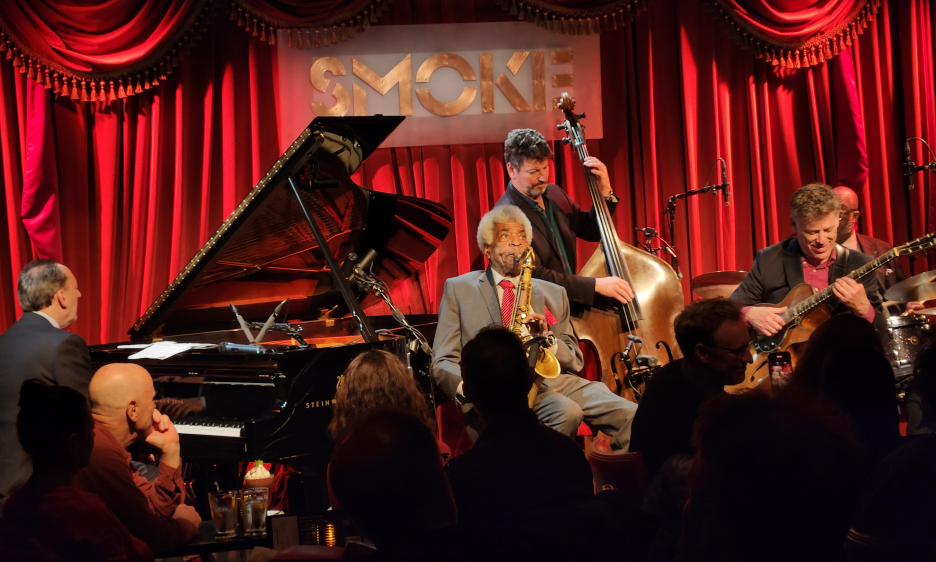Home » Jazz Articles » Live Review » George Coleman at the 25th anniversary of Smoke Jazz Club
George Coleman at the 25th anniversary of Smoke Jazz Club

Courtesy Paul Reynolds
Smoke Jazz Club
25th Anniversary Concert
New York, NY
April 12, 2024
Jazz thrives in places that rarely endure for very long. Sure, there are the longtime jazz temples—the Village Vanguard in New York, Ronnie Scott's in London, Preservation Hall in New Orleans—but most premier clubs are lucky to last into adulthood, at least as jazz-only venues. The rent's too damn high, the music too commercially marginal.
Smoke Jazz & Supper Club, on Manhattan's Upper West Side, is a happy exception to that rule. Founded in 1999—in a space that was once home to Augie's, a beloved jazz dive—the place has survived, even thrived, where many Manhattan peers have fallen (the Jazz Standard, 55 Bar, Cleopatra's Needle) or all but abandoned straight ahead jazz bookings (Iridium).
The club enters its second quarter century as committed as ever to pure jazz. Smoke strutted that devotion during a 25th anniversary weekend that featured George Coleman., who opened the club in April 1999. The rest of the anniversary band were also players with longtime associations to the club: guitarist Peter Bernstein, pianist Doug Weiss, bassist John Webber, and drummer Carl Allen.
Coleman himself is a miracle of endurance. Having turned 89 in March, the tenorist looked frail as he walked to the stand, leaning heavily on a Smoke employee. But he was musically authoritative and distinctive once he was seated and the mouthpiece hit his lips.
Coleman's playing was less powerful in than in his 60s heyday, unsurprisingly, but he has never been a player of gale-force power. At Smoke, as at his appearance last month at Bob Weir and Others at the Jazz Foundation of America Gala Concert at the Apollo Theater, Coleman leaned into his trademark short and stylish phrases in solos that exuded elegance and thoughtfulness more than volume and musical muscle. Coleman was no fading flower when it came to leading the band; imperiousness is more the idea. He issued intermittent instructions, sometimes barked and sometimes gestured—as when he insistently pointed to Bernstein to comp along with a Weiss solo.
When pleased, Coleman indicated his approval through warm smiles, nods and raised fists. In less happy moments, he didn't hold back---at one point even calling Jeb Patton up from the crowd to briefly replace Weiss and play the chords to the bridge of "When I Fall In Love" the way he wanted. At another juncture, he stopped a piece and decided to abandon it when the first bars weren't to his liking.
It was a little awkward, if also guiltily entertaining. Kudos to his Smoke sidemen in keeping cool through it all, and providing unshowy support that allowed their masterful leader to shine. The drama demonstrated Coleman's continued commitment to getting the music right, a trait that helped the self-taught musician ascend to the 1963 quintet of Miles Davis, and then to appearances on albums like 1965's Maiden Voyage by Herbie Hancock, where his sinuous opening solo on the title track is a classic.
The set ended with a blues, a fitting choice for a Memphis native whose formative years in the early '50s were spent in the band of B.B. King. The soulful squeeze in Coleman's phrasing made his soloing during the set closer among the most affecting of the night.
Refurbished to red plushness in its post-pandemic reboot, Smoke's walls are adorned with photos of other veteran players, including Harold Mabern (who was Coleman's pianist on Smoke's opening weekend). That pride of place for elder statesmen is the doing of Smoke co-owner (and former Augie's bartender) Paul Stache—who sat at the back on Friday, roaring his approval for "Big George!" Stache has created both a club and a record label (Smoke Sessions Records) that often showcase underappreciated master players who are long past the years in which they're likely to get a Vanguard gig or a Blue Note or Verve recording contract.
Indeed, at the weekend shows, he was selling Big George (Smoke Sessions Records, 2024), the latest of his label's 75-plus titles—featuring Coleman with the band One for All. What could better demonstrate the endurance of the tradition than having people who are younger than the club they've just attended step into the night with a new piece of vinyl featuring an octogenarian jazz artist under their arms?
Comments
About George Coleman
Instrument: Saxophone, tenor
Related Articles | Concerts | Albums | Photos | Similar ToTags
Live From New York
George Coleman
Paul Reynolds
United States
New York
New York City
Village Vanguard
Ronnie Scott's
Preservation Hall
Smoke Jazz Club
Peter Bernstein
Doug Weiss
John Webber
Carl Allen
Bob Weir and Others at the Jazz Foundation of America Gala Concert at the Apollo Theater
Jeb Patton
Miles Davis
Maiden Voyage
B.B. King
Harold Mabern
Smoke Sessions
Blue Note
Verve
One For All
For the Love of Jazz
 All About Jazz has been a pillar of jazz since 1995, championing it as an art form and, more importantly, supporting the musicians who create it. Our enduring commitment has made "AAJ" one of the most culturally important websites of its kind, read by hundreds of thousands of fans, musicians and industry figures every month.
All About Jazz has been a pillar of jazz since 1995, championing it as an art form and, more importantly, supporting the musicians who create it. Our enduring commitment has made "AAJ" one of the most culturally important websites of its kind, read by hundreds of thousands of fans, musicians and industry figures every month.
























